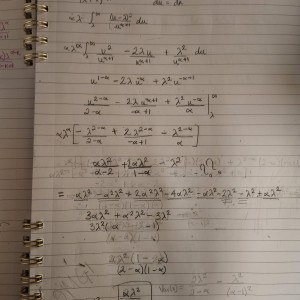The derivation of the formula for variance for a Pareto Distribution
I need help with the step-by-step process of how to derive the formula for variance.
First I need to see how to calculate E[X^2] and then how to get variance using Vax[X] = E[X^2] - (E[X])^2.
I'm pretty sure I'm doing something wrong with the integration of x^2*ab/(b+x)^a+1 and the algebra that follows.
I've been trying this for 2 days now and I cannot seem to get it.
I've posted a picture of my attempt so you can see what I'm expecting.
Answer
- The questioner was satisfied with and accepted the answer, or
- The answer was evaluated as being 100% correct by the judge.
-
Leave a comment if you need any clarifications.
-
How did you know to multiply and divide by(a-k) lambda^(a-k)????
-
We would like the function inside the integral to be a Pareto distribution, since we know it integrates to 1. So you try to create a Pareto distribution algebraic manipulations.
-
Shouldnt the end of be negative?? for when we integrate and then plug in infinity, that part goes to 0 as infinity is in the denominator but then it's minus a minus one?? To be more specific what is the step between a*lambda^a/(a-k)/((a-k)lambda^(a-k) multiplied by the integration of (a-k)lambda*^(a-k)/x^(a-k+1) dx and the last step. Because I get (a*lambda^a)/(a-k)lambda^(a-k) multiplied by 0 - 1
-
OOOO are you using the fact that the density integrates to 1 therefore in that last step for E[X^k] a is (a-k)? then since it is the integral of the density it's just equal to 1!!
-
Yes, I revised my solution and added some more details.
- answered
- 1588 views
- $20.00
Related Questions
- Weighted average issue
- Confidence Interval,Standard Deviation,Mean
- Can someone explain why the attached R-Studio Code, provided by the author, does not create the output like in his book?
- Statistics Probability
- Coincidence or pattern?
- Conditional mean and variance for joint PDF
- Intro to stats symmetry vs skew and missing data values questions
- Why is the t-test for two independent samples $\ t^* = \frac{(\bar{x}_1 - \bar{x}_2)}{\sqrt{\frac{S_1^2}{n_1} + \frac{S_2^2}{n_2}}}$?


